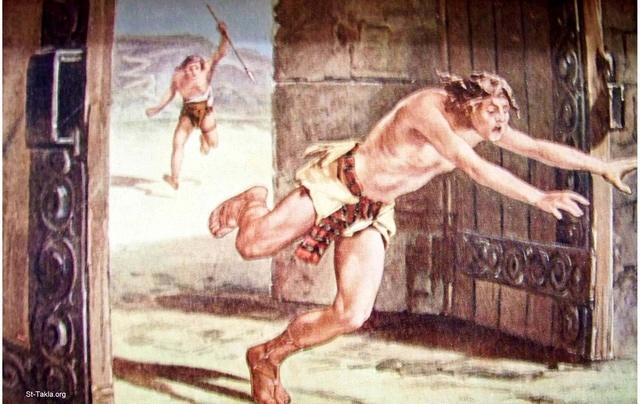 Deuteronomy 28:20–68; Psalm 119:25–48; Isaiah 55; Matthew 3
Deuteronomy 28:20–68; Psalm 119:25–48; Isaiah 55; Matthew 3
In 2011, I attended the Global Leadership Summit. On the second day, after hearing a half dozen amazing speakers and leaders, the host Bill Hybels, introduced a sweet, unassuming woman named Maggie Gobran. His summary of her life was brief and, as I recall, unremarkable. He explained how Maggie answered God’s calling on her life. She was to serve the poorest of the poor in Cairo. In obedience, she gave up her upper-middle class life as an academic to become a servant to the children in the slums of Cairo. She founded an organization called Stephen’s Children that had become world-class. Her efforts even earned her a nomination for the Nobel Peace Prize. As Bill left the stage, all eyes were keenly focused on Maggie, eager to hear her story and to glean her leadership genius.
Words cannot describe the next several minutes. I remember standing, looking down on the stage and thinking about how small she was. Maybe 5’ tall and 80 pounds. I didn’t see an ear to ear grin, nor did I see a face of anger. I saw depth. As she stood there silently, applause erupted, bringing every person to their feet. Clearly, Maggie was someone special. Rather than dissipating like a normal standing ovation, this one continued to grow. The energy in the room had a presence. As the applause gave way to silence, she knelt and bowed her head. It was as if all the love in the world existed in that single auditorium. The best I can say is that it radiated from her, touching the core of every soul, overpowering even the hardest of hearts. Dry eyes were impossible.
I can’t help but wonder if John the Baptist was a bit like Maggie Gobran. Based on the description in today’s reading, he wore a garment of camel’s hair and a leather belt around his waist, most people would never notice him, just like Maggie. Even crazier, “John’s food was locusts and wild honey” (Matthew 3:4 ESV). Despite John’s oddities and seemingly repellent characteristics, people flocked to him, just like Maggie. This is the important thing. What is it that was drawing the people and where did it come from?
You probably already know the answer to that question. Of course, you are going to answer Jesus, right? To be honest, I am not happy with that answer. Of course, I believe that it is the right one, but it’s too simple. The answer is trite. It does not solve the riddle of how I get it. How do I get a pure heart that goes irresistibly into the world? I found the answer to that question in a short story that was originally presented to me by Dr. JK Jones. In his book What the Monks Can Teach Us, he summarizes Nathaniel Hawthorn’s story of The Great Stone Face. The story was so impactful for me that I wanted to share it with you exactly as Dr. Jones has written it in his book.
Hawthorne describes a people living in a valley, shadowed and surrounded by a huge rock formation. The rocks are shaped together in such a manner that if viewed from a proper distance, a great face can be seen. The face appears divine. It seems to express both warmth and sweetness while embracing all people who look upon it. Hawthorne’s main character, Ernest, is a man who has gazed upon the Great Stone Face day after day and year after year. His mother first passed on to Ernest the ancient legend when he was a boy. According to the story there would one day come an incarnation of the great rock. Throughout the narrative rumors surface that a man has appeared who resembles the great stone face. First, Mr. Gathergold, a shrewd and active man whose name identifies his chief ambition in life, is thought to be fulfillment of the prophecy. Though the people of the valley want ot believe that Gathergold is the image of the great face, Ernest knows he is not. Later, a war hero, Old Blood-and-Thunder, is heralded to be the one in whom the likeness is seen. Again, Ernest recognizes what the crowd does not. The general is only a war-worn, weather-beaten hero. Years go by, the people have settled down and now are able to admit the previous two men were not the prophecy’s fulfillment. A third character appears in the story, Old Stony Phiz, a man in whom is found a magical oratory skill. His spoken words are like the sweetest music ever heard. As is expected, the people of the valley once again see in this man the Great Stone Face, and once again Ernest is disappointed. Time reveals that Ernest is correct and the people in error. Years pass by. Ernest is quite old. People come to him from all over seeking the understanding of this simple man that cannot be found in books. From college professors to statesmen they visit with this gentle, sincere soul. One last time Ernest hopes he will meet that special one who has been foretold. A poet does appear that Ernest admires greatly, but both the poet and Ernest realize he is not the one. The story closes with Ernest being asked by neighboring villagers to speak to them and while the golden sun is setting, both the poet and people recognize what Ernest has not and cannot. Ernest, himself, is the fulfillment of the Great Stone Face! In his humility, constant gaze, and unquenchable seeking he has become that which he sought.
As far as I can tell, Maggie Gobran, John the Baptist, even Hawthorn’s Ernest became irresistible in the same way. In fact, it’s true for all of us. We become what we seek and serve every day.
When you are ready to seek hard after God, check out this awesome program presented by Dr. JK Jones and the incredible faculty at Lincoln Christian University.

 Deuteronomy 13–14; Psalms 99–101; Isaiah 41; Revelation 11
Deuteronomy 13–14; Psalms 99–101; Isaiah 41; Revelation 11




 three days, so I wanted to make the most of it. I had two goals. First, I wanted to spend a lot of time with him, and second, I wanted to spend some time planning for the rest of 2016. If I am completely honest, one major purpose in spending a lot of time with Freddy is to examine how he is faring. I mean, we only have six, or so, years before he sets off for college! As a good father, I need to evaluate his planning and dreaming skills. Additionally, I want to influence what is in his head.
three days, so I wanted to make the most of it. I had two goals. First, I wanted to spend a lot of time with him, and second, I wanted to spend some time planning for the rest of 2016. If I am completely honest, one major purpose in spending a lot of time with Freddy is to examine how he is faring. I mean, we only have six, or so, years before he sets off for college! As a good father, I need to evaluate his planning and dreaming skills. Additionally, I want to influence what is in his head. How could we? The majesty of His creation blasted its way deep into our hearts. In reply, we stomped and shouted throughout his handiwork. We left giant footprints as our voices echoed throughout the valley. We sang stupid songs, threw snowballs and filled the air with laughter. We saw our breath in the cold mountain air and hollered over the thunderous roar of waterfalls. We pondered big questions like “why did God make it all,” and “why did he make it so complex?” We settled on really simple answers like “because He can,” and “so that we will never get bored.” We stood motionless and silent, marveling at how He did it. We worshipped!
How could we? The majesty of His creation blasted its way deep into our hearts. In reply, we stomped and shouted throughout his handiwork. We left giant footprints as our voices echoed throughout the valley. We sang stupid songs, threw snowballs and filled the air with laughter. We saw our breath in the cold mountain air and hollered over the thunderous roar of waterfalls. We pondered big questions like “why did God make it all,” and “why did he make it so complex?” We settled on really simple answers like “because He can,” and “so that we will never get bored.” We stood motionless and silent, marveling at how He did it. We worshipped!

You must be logged in to post a comment.